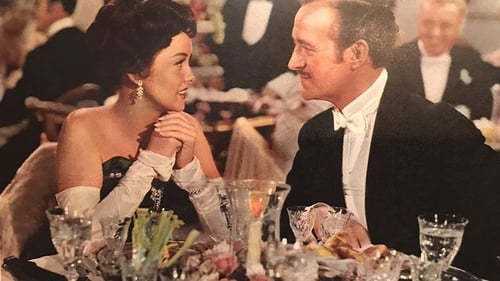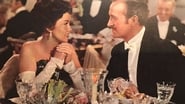richard-1787
It's easy to dismiss this as a silly movie - which it is - and say that all that's worth paying attention to is the music, which is not true in several ways.Yes, the plot is silly. But it shows how Lanza could be presented to show off his most attractive qualities. Though he is already verging on the portly in some of the scenes, and though he is more or less handsome depending on the angle from which he is photographed, the fact remains that he comes across as a generally handsome guy with a lot of very powerful virility. That's not something to be dismissed lightly.There are lots of examples of that in the movie, but perhaps the most obvious, if also, in certain respects, the most troubling one, is the last scene, the performance of the love duet that closes Act I of Madama Butterfly. You have to forget that, in the opera, Butterfly is only 15, otherwise this comes across as very uncomfortable to watch. Grayson certainly doesn't look 15, though, so what we have is a young naval officer who is clearly very "eager" (you know the word) to get his new "wife" into bed, and who quickly subdues any efforts on her part to delay the wedding night. Modern productions of the opera make Pinkerton more nuanced, and have to. Here, the officer knows what he wants, and he's not going to take no for an answer, or wait for Butterfly to come around by charming her. It's a very powerful performance. Not, perhaps, the most faithful to the libretto, but completely convincing. Lanza conveys an animal magnetism that is very powerful.The other aspect of Lanza that comes across very well is his singing of popular music. He really gets into it, and he can sing it in a very natural and appealing fashion. Nothing makes this clearer than the first time he sings "Be my love" with Grayson. She starts out, and she is NOT good. Yes, the notes are fine. But she c-a-r-e-f-u-l-l-y e-n-u-n-c-i-a-t-e-s every syllable, and it sounds completely unnatural, like an opera singer trying to sing pop but with no idea how to do so. Then Lanza joins her, and you hear the difference. He enunciates clearly, but the words sound completely natural. It's no wonder he was able to turn that into a major hit. What it shows is what MGM executives evidently did not understand: Lanza had a magic when doing popular music. Later efforts to get him to do 1920s American operettas, like the Student Prince, which were far more formal, took him out of what he could do very well.You see this in the several opera excerpts Lanza sings. He's formal and stilted in the Flower Song from Carmen, where he is clearly working on getting the French right, and he sings it all at one volume level, which makes it much less interesting than other tenors' performances. When he sings O Paradiso (in Italian) from L'Africaine et M'appari (again in Italian translation) from Marta he is much more at ease. And he is downright first-rate in the Butterfly duet (in the original Italian, of course), where it is very obvious that he knows just what every word means, and means them.I don't have anything to add about the rest of the movie. Grayson is no favorite of mine. She's alright in the canary fluff that was still done in those days - O luce di quest'anima, from Linda di Chamounix, Je suis Titania, from Mignon, Ombre légère, from Dinorah. She's much less right in the excerpt from Lucia, and not at all my cup of tea in Butterfly. She sounds as if she grew up listening to Lily Pons recordings, but she's not as good.MGM should have paid closer attention to what did and did not work in this movie, and given Lanza movies that played off his strengths and avoided what he did less well.
writers_reign
It seems fairly obvious that at MGM they were staunch believers in the saying if it ain't broke don't fix it. In 1949 they launched their new signing Mario Lanza in That Midnight Kiss; he played a truck driver who both liked to and could sing as the insipid Kathryn Grayson discovered when he delivered a piano to her home. By chance Grayson was a fledgling opera singer and gave Lanza a send-in with Jose Iturbi. In passing Grayson fell for Lanza but he had an 'understanding' with Marjorie Reynolds. So much for plot. The film made big bucks so they remade it the next year. This time Lanza is a shrimp fisherman who likes to and can sing, Grayson is now a full-fledged opera diva who discovers him by chance and this time around, just so we can't say 'not again', it's Lanza who falls for her and her that has an 'understanding' with David Niven as the impresario who gives Lanza a crack at Madame Butterly. In the previous film J.Carroll Naish scored as Lanza's father so, for extra insurance, he's here again but this time as Lanza's uncle. Subtle, right. There was only one 'new' song in That Midnight Kiss so MGM put Sammy Cahn and Nicholas Brodzsy to work and they came up with Lanza's first million seller Be My Love albeit Grayson sings it first and then they duet. By 1950 there was probably just enough post-war hysteria sill hanging around to make this palatable.
rap-39
A typical Lanza flick that had limited audience appeal with a weak story line that was put together simply to justify Lanza's MGM contract at the time.As reported by member Lastliberal (above) Grayson could not stand Lanza because of his obscene advances towards her off (and sometimes on) camera. In addition, his gutter mannerism and the continual smell of alcohol in her face during scenes they did together were intolerable. After doing their second (and last) film together, "Toast of New Orleans", the normally quiet Grayson stormed into Louie B. Mayer's office and told him in no uncertain words that she would never work with Lanza again – period. Mayer felt that Grayson was much more valuable to MGM then Lanza, so Grayson's statement stuck. Grayson went on to star in a number of widely received (and far more profitable) musicals with Howard Keel and others. Later in life when asked to compare Lanza and Keel her reply was that there was no comparison between them, and that Keel was great to work with and had much more appeal to the "real people" in the audiences.
maritere1939
I've watched this film more than 50 times, and as much as I watch as much as I like best. Mario Lanza was just unique, I agree that he did not educated his voice enough, but his natural voice was so wonderful, none of the best tenors hadn't his magnificent voice, is enough to know that Mo. Toscanini said that was "The Voice of the Century". This film is fresh and light and romantic, Mario's performance of "Be my love" as a duet is nice too, and "Madame Butterfly duet" is the greatest I've ever heard. David Niven, J. Carroll Naish and Rita Moreno, each one in the role they played are just wonderful too. Mario Lanza should be in the opera stage but if so, common people didn't had the opportunity to be delight with opera.




